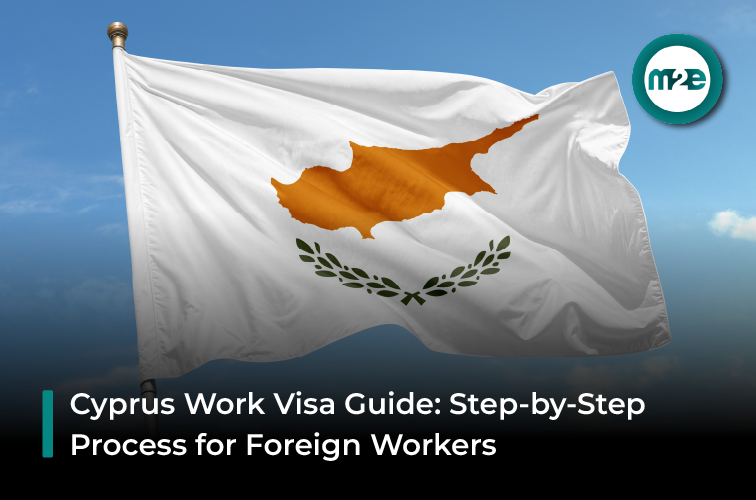
Cyprus Work Visa Guide: Step-by-Step Process for Foreign Workers
Cyprus is one of Europe’s fastest-growing employment destinations for international workers. Its strong economy, strategic location, and stable political environment make it an attractive choice for both skilled professionals and manual laborers. Whether you are a driver, nurse, IT engineer, or hotel staff member, Cyprus offers secure job opportunities with legal work permits and clear visa procedures.
This complete guide explains every step of the Cyprus work visa process — from job search to residence permits — and highlights industries currently facing shortages of blue-collar and white-collar professionals.
Step 1: Overview of the Job Market in Cyprus
Cyprus has a growing demand for foreign labor due to a combination of tourism expansion, infrastructure development, and a shortage of local workers. The job market is divided into two major segments: blue-collar (manual and technical work) and white-collar (professional and administrative roles).
Key Sectors and Salary Overview
|
Sector |
Category |
Demand Level |
Average Monthly Salary (€) |
|---|---|---|---|
|
Construction |
Blue-collar |
High |
1,200–1,800 |
|
Hospitality and Tourism |
Blue-collar / Semi-skilled |
Very High |
1,000–1,500 plus tips |
|
Manufacturing |
Blue-collar |
Medium |
1,100–1,600 |
|
Healthcare and Nursing |
White-collar |
High |
1,800–2,500 |
|
Information Technology |
White-collar |
Very High |
2,000–4,000 |
|
Finance and Accounting |
White-collar |
Medium |
2,000–3,000 |
|
Agriculture and Farming |
Blue-collar |
High |
1,000–1,300 |
|
Retail and Customer Support |
Mixed |
Medium |
1,200–1,700 |
Step 2: Blue-Collar and White-Collar Shortages in Cyprus
Blue-Collar Job Shortages
- Construction workers, masons, plumbers, electricians
- Welders and fabricators
- Housekeepers and hotel staff
- Waiters, cooks, kitchen helpers
- Drivers with category C or CE licenses
- Farm, greenhouse, and food-processing workers
- Maintenance, HVAC, and cleaning technicians
White-Collar Job Shortages
- Software developers and IT engineers
- Cybersecurity professionals
- Accountants and auditors
- Nurses, lab technicians, and medical assistants
- Sales, marketing, and business development executives
- Civil, electrical, and mechanical engineers
- Administrative managers and financial analysts
Cyprus continues to rely on foreign labor, especially in hospitality, healthcare, and construction, where demand often exceeds the availability of local workers.
Step 3: Finding a Job and Employer Sponsorship
Foreign nationals cannot apply for a Cyprus work visa without a confirmed job offer. You must first:
- Find a registered employer in Cyprus who is authorized to hire non-EU citizens.
- Sign a written employment contract detailing your job title, salary, and duration of employment.
- Ensure your employer agrees to act as your visa sponsor throughout the process.
Employers in Cyprus must prove that the job position could not be filled by a Cypriot or EU citizen before offering it to a foreign worker.
Step 4: Types of Work Permits and Visas in Cyprus
|
Type |
Purpose |
Validity |
Renewable |
|---|---|---|---|
|
Entry Visa (Type D) |
Long-term visa for employment purposes |
Up to 1 year |
Yes |
|
Temporary Residence and Employment Permit |
Authorizes living and working legally in Cyprus |
1–3 years |
Yes |
|
EU Blue Card |
For highly skilled professionals with high income |
2 years |
Yes |
|
Seasonal Work Permit |
For agriculture, tourism, and short-term labor |
Up to 6 months |
Yes |
Non-EU citizens require both a work permit (granted to the employer) and a residence permit (granted to the employee) to live and work legally in Cyprus.
Step 5: Eligibility Requirements
To be eligible for a Cyprus work visa, you must meet the following criteria:
- Hold a valid job offer from a Cyprus-based employer.
- Have a passport valid for at least six months.
- Provide a clean criminal record certificate from your home country.
- Present a medical certificate showing good health and no contagious diseases.
- Possess valid medical insurance coverage for the duration of your stay.
- Have proof of accommodation in Cyprus.
- Submit academic and professional qualifications if required.
- Ensure your employer receives labor approval from the Department of Labour.
Step 6: Step-by-Step Application Process
|
Stage |
Responsible Party |
Description |
Estimated Time |
|---|---|---|---|
|
1. Employer’s Labor Market Test |
Employer |
Employer applies to the Department of Labour for permission to hire a foreign worker. |
2–3 weeks |
|
2. Work Permit Application |
Employer |
Application submitted to the Civil Registry and Migration Department. |
2–4 weeks |
|
3. Entry Visa Application |
Applicant |
Apply for a Type D Visa at the Cyprus Embassy in your country. |
2–3 weeks |
|
4. Travel and Arrival in Cyprus |
Applicant |
Enter Cyprus after receiving visa approval. |
Variable |
|
5. Residence and Employment Permit |
Applicant |
Register with the Aliens’ Register and apply for residence permit within seven days. |
1–3 weeks |
|
6. Biometric and Card Issuance |
Applicant |
Submit biometrics and collect residence card (Pink Slip). |
1–2 weeks |
The total processing time is generally between six and ten weeks if all documents are complete and correctly translated.
Step 7: Required Documents
Prepare the following documents before applying:
- Valid passport and photocopies
- Passport-size photographs
- Signed employment contract approved by the Department of Labour
- Criminal record certificate
- Medical examination report
- Health insurance proof
- Proof of accommodation in Cyprus
- Employer’s business registration documents
- Receipt of paid application fees
All foreign documents must be translated into English or Greek and authenticated by an apostille or by the Cyprus consulate.
Step 8: Fees, Validity, and Renewal
|
Service |
Fee (€) |
|---|---|
|
Entry Visa Application |
70 |
|
Residence and Employment Permit |
70–80 |
|
Registration in Aliens’ Register |
70 |
|
Renewal of Residence Permit |
80 |
|
Stamp Duty on Employment Contract |
Variable |
Permits are typically valid for one to three years. Renewal applications should be submitted at least one month before the current permit expires. Overstaying or working without a valid permit may lead to fines or deportation.
Employee Rights and Benefits
- Legal protection under Cypriot labor laws
- Paid annual leave and national holidays
- Social insurance and healthcare benefits
- Equal pay for equal work regardless of nationality
- Right to renew and transfer employment (with approval)
- Eligibility for permanent residence after five years of legal stay
Average Salary Guide by Occupation
|
Occupation |
Category |
Average Salary (€ per month) |
|---|---|---|
|
Waiter or Cook |
Blue-collar |
1,000–1,500 |
|
Construction Worker |
Blue-collar |
1,200–1,800 |
|
Truck or Delivery Driver |
Blue-collar |
1,200–1,600 |
|
Nurse or Caregiver |
White-collar |
1,800–2,500 |
|
Software Engineer |
White-collar |
2,500–4,000 |
|
Accountant or Auditor |
White-collar |
2,000–3,000 |
|
Farm Worker |
Blue-collar |
1,000–1,300 |
|
Electrician or Plumber |
Blue-collar |
1,300–1,800 |
1. How can a foreigner get a job in Cyprus?
Foreigners can obtain a job in Cyprus by securing a job offer from a licensed Cypriot employer that is authorised to sponsor non-EU workers.
2. Who applies for the Cyprus work permit?
The Cyprus employer applies for the work permit on behalf of the foreign worker at the Department of Labour, the Civil Registry, and the Department of Migration.
3. What is the difference between a Cyprus work permit and a Cyprus work visa?
- Cyprus Work Permit: Authorises legal employment inside Cyprus.
- Cyprus Work Visa (Type D): Allows entry into Cyprus for employment purposes after obtaining a work permit.
4. How long is a Cyprus work permit valid?
A Cyprus work permit is typically valid for one year and can be renewed annually as long as the job remains ongoing.
5. How long does it take to get a Cyprus work permit and work visa?
The total process takes around 6–10 weeks:
- Work permit: 4–6 weeks
- Work visa: 2–4 weeks
6. What documents are required for a Cyprus work permit and visa?
- Valid passport
- Signed job contract
- Work permit approval
- Medical and TB test results
- Police clearance certificate
- Health insurance
- Proof of accommodation
7. What kind of jobs are available for foreigners in Cyprus?
Foreigners can find employment opportunities in various sectors, including hospitality, construction, agriculture, domestic work, cleaning, caregiving, and food processing.
8. What is the minimum and average salary for foreign workers in Cyprus?
- Minimum wage: around €1,000/month (2025)
- Average foreign worker salary: €900–€1,300/month
- Skilled jobs (chefs, electricians, drivers): up to €1,500–€2,000/month
9. Do Cyprus employers provide accommodation and meals?
Yes, many Cyprus employers (especially in hospitality and domestic sectors) provide free or subsidised housing and meals to foreign workers.
10. What are the working hours and holidays in Cyprus?
Foreign workers in Cyprus typically work 8–10 hours per day, 6 days a week, with annual paid leave as stipulated under the Cyprus labour law.
11. Are medical tests required for a Cyprus work permit?
Yes, medical and tuberculosis (TB) tests are mandatory before your Cyprus work permit is issued.
12. Can a foreign worker change employers in Cyprus?
Foreign workers in Cyprus can change employers only with approval from the Department of Labour. Unauthorised job changes are not allowed.
13. Can foreign workers bring their families to Cyprus?
Usually not allowed for low-skilled categories. Family reunification is possible after a period of long-term legal employment and residence.
14. Can a Cyprus work permit lead to permanent residency?
Yes, after 5 years of continuous legal work and residence, you can apply for long-term or permanent residency in Cyprus.
15. Do foreign workers in Cyprus pay income tax?
Yes, but only if annual income exceeds €19,500. Most low-wage foreign workers in Cyprus are exempt from income tax.












